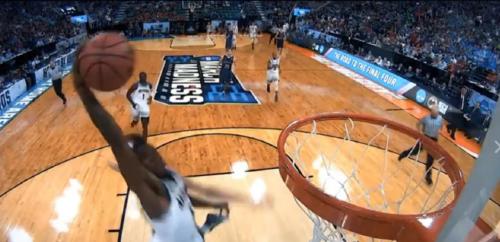March Madness comes to a fevered end this coming Monday, and while many of us will watch the Final Four duke it out this weekend from our couches or from our small screen devices while on-the-go, others will experience the matches courtside, without actually having to make the trip out to Phoenix. That's because NCAA and Turner now offer a compelling virtual reality (VR) experience for the Sweet 16 through the championship game, giving fans the option of buying either a "gold" or "silver" ticket for the tournament, each of which offers different VR experiences.
Mark Johnson, SVP of Turner Sports Digital, shared a bit about what's different this year, and what Turner's goals are with this type of sports coverage. "Our ultimate goal is to get the fan closer to the game," Johnson explained. Fans who can't make it to Phoenix for whatever reason can simply tap into the hardware in their phone and watch the action unfold as if they were right there in the stadium. "The ticket concept makes perfect sense. You are physically buying a ticket and sitting in the front row, courtside to watch this basketball game. For sports, [VR] is just a natural fit," said Johnson.
The silver ticket VR experience, which was offered last year for just the Final Four and championship game, plays off of the linear broadcast and gives sports fans a one-camera angle view. This time around, Turner's goal was to expand the viewership from last year by adding additional viewpoints, and this is where the gold ticket comes in. With a more customized overall production containing specific play-by-play color analysts who will walk the fans through the games and a sideline reporter, the gold ticket offers viewers an enhanced, up close and personal experience of the tournament. Since this is the first time they are offering this option, Johnson explained that unrolling it earlier in the tournament during the Sweet 16 phase has helped to iron out production details for the final matches. "Anytime you are trying out any sort of new technology, you are going to learn along the way. The ability to do some games earlier in the tournament was important for us so we could get in, learn some things, and have an even better experience during the Final Four," said Johnson.
As the VR experience is still in the experimental stages pretty much everywhere we look, Turner is also in the midst of fine-tuning its dive into VR madness. For the last few games, it's looking like the gold ticket will involve six camera angles, including courtside sideline views, a camera viewpoint of the basket itself, a camera or two on the student section to capture the vibe and excitement from there, and a camera angle from higher up to give fans a different outlook of the entire court and facility.
Naturally, the gold ticket attracts a certain technologically-savvy demographic. The experience requires a proper headset, phone and internet connection. And it's the people who are more inclined to see and consume new content on new platforms, and sports fans who are excited to see this type of content on the VR platform, who will sign up. But adoption of the VR platform by mainstream sports audiences may not be too far off in the future. "I think you are seeing more companies coming out with their version of VR," said Johnson. "And that's the first step. You need more devices out there in the general public, and you need more awareness around [VR]."
As program creators like Turner continue to experiment and put new content and new apps out there, more and more consumers will likely become engaged with this unique way of watching sports. "It's like when the new smartphones came out. It takes time to adopt, it takes more mass production of the hardware and the technology, but if the content is there, eventually you'll see people embrace it," he added.
"Fans are excited about this new technology, and we are optimistic that we are going to see our year-over-year numbers improve over the last Final Four," said Johnson. "The entire VR space is a playground right now. All the companies right now in VR are excited to partner with content providers like us to figure out, 'What do fans want?'"
